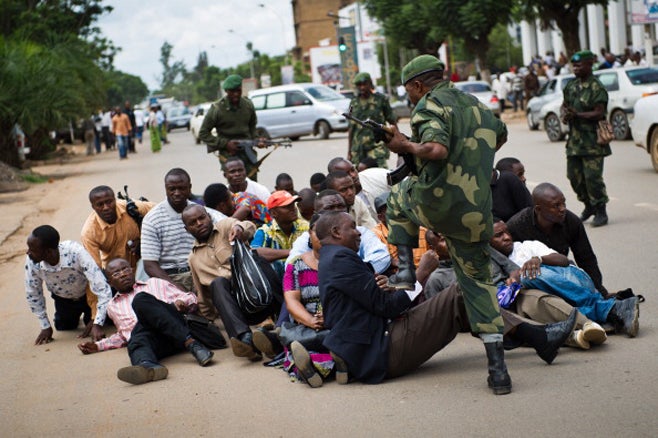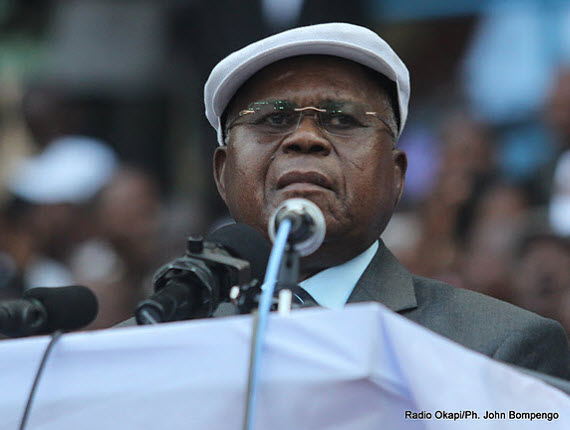By Zach Waksman
Impunity Watch Reporter, Africa
LAGOS, Nigeria – The past week in Nigeria was marked by a nationwide labor strike that began after the government ended a subsidy on gasoline, which caused its price, and that of many other essentials, to more than double. On Monday, President Goodluck Jonathan announced a partial rollback on the cost of fuel, which led unions to suspend the strikes for now. Labor leaders warn that they are willing to resume strikes at a later date.
For Africa’s most populous country, the announcement comes as a small return to normalcy as the country’s markets reopened for the first time since the strike began on January 9. But the situation remains fragile, as the partial rollback does not address the full effect of the initial revocation. The subsidy’s removal on January 1 marked the beginning of a chain reaction in the economy of Africa’s most populous country. Products such as onions, peppers, and watermelon seeds also saw a substantial increase in price due to the cost of transporting them to market.
Nigeria is Africa’s largest producer of oil, but it must import most of its refined fuel products due to a lack of its own refineries. Despite this wealth, most Nigerians live on about one dollar per day, while the petroleum profits are spread among the elite. The only benefit that most see is a lost fuel cost, the result of a national subsidy. The subsidy’s suspension caused the price of gasoline to jump from N65 (N is for “naira,” the national currency.) per liter on December 31 to N141-145, the equivalent of a spike from $1.70 per gallon to $3.50 per gallon in the United States.
“Government will continue to pursue full deregulation of the downstream petroleum sector,” Jonathan said in a televised address. “However, given the hardships being suffered by Nigerians, and after due consideration and consultations with state governors and the leadership of the National Assembly, government has approved the reduction of the pump price of petrol to N97 per litre.”
Following Jonathan’s announcement, Nigeria Labour Congress chief Abdulwahed Omar said that the unions would formally suspend the strike, protests, and rallies. The decision comes in part due to fears that the rallies could be hijacked for other purposes. At least ten people were killed during the week-long strike, and at least 600 were treated for injuries.
Talks between the government and labor leaders are still ongoing. Senate President David Mark held a meeting at his home on Sunday. After it adjourned, Governor Rotimi Amaechi of Rivers State, one of the attendees, spoke to the media and appeared certain that a permanent answer would be found soon.
“I believe that solutions would be found to the strike. I believe that we are at the verge of finding a solution to it,” he said. “We have held a meeting and we have looked at the solutions and we think that with Labour, we can find a joint solution to the problem and you must realize first that the President is patriotic in his decision and all of us in government are backing him. Labour agrees to deregulation. I don’t know if there is any point that they are not part of deregulation. Their argument is how and when and we are sorting out all those fine details and we will find [a] solution to it.”
What that solution is, however, remains unknown. But for the people of Nigeria, this move will not be sufficient to mollify an already disgusted population.
“When the equation is still Hobbesian, people are not going to participate,” said Ricardo Soares de Oliveira, a lecturer at Oxford University and an expert on Nigerian oil politics, referring to the grimness of daily life in Nigeria. “People perceive this as a raid on their resources.”
For more information, please see:
BBC — Nigerian Fuel Subsidy: Strike “Suspended” — 16 January 2012
Guardian — Jonathan, Govs, N’Assembly in Frantic Search for End to Strike — 16 January 2012
New York Times — Amid Strikes, Nigeria Rolls Back Gasoline Price — 16 January 2012
Nigerian Tribune — FG Pegs Fuel at N97 per Litre; Labour Suspends Protests, Continues Strike — 16 January 2012
Washington Post — Labor Union Announces Suspension of Strike over Fuel Prices in Nigeria amid Violence — 16 January 2012



